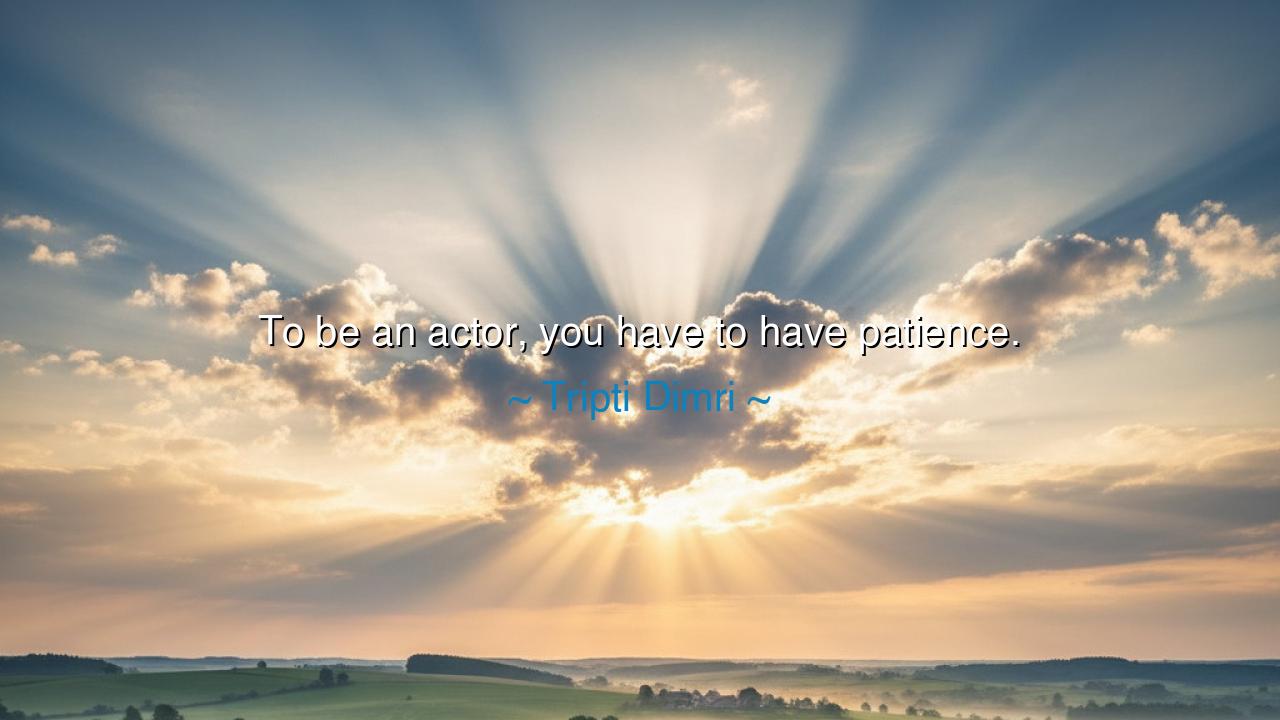
To be an actor, you have to have patience.






Hear the simple yet profound words of Tripti Dimri: “To be an actor, you have to have patience.” Though short in form, these words carry the weight of ages, for they speak not only of the stage and the screen, but of the journey of every soul who seeks to embody a role greater than themselves. Acting, in its truest essence, is the art of transformation—of becoming another, of entering into lives not one’s own, of revealing the hidden truths of humanity. And such transformation, as Dimri reminds us, cannot be rushed. It demands patience, for art grows not in haste but in time.
When she speaks of the actor, she points not only to those who perform before audiences, but to all who live with courage in the face of uncertainty. For to act is to step into the unknown, to take on roles untested, to risk rejection, and to strive for authenticity in a world quick to judge. The patience required is not merely the waiting for opportunities, but the endurance to withstand failures, the strength to learn slowly, the humility to rehearse again and again until truth is found.
The stage has ever been a mirror of life itself. Consider the journey of Sir Laurence Olivier, one of the greatest actors of his time. Early in his career, he was mocked for stiffness, told that he lacked natural talent. Yet he endured. With patience, he studied, he failed, he practiced. He gave years to the slow shaping of his craft. In time, he became not merely an actor but a master of transformation, embodying kings and warriors, villains and saints. Had he rushed, had he despaired, he would have vanished into obscurity. But with patience, he rose to greatness.
This lesson is not only for actors, but for all who labor in any art or calling. The sculptor must wait as the marble reveals its form. The writer must endure countless drafts before words sing with clarity. The farmer must sow and wait through long seasons before harvest arrives. So it is with the actor—so it is with life. Greatness is not in speed, but in constancy, not in rushing, but in enduring.
Dimri’s words also remind us that the path of the actor is filled with trials. Long hours of auditioning, endless rejections, forgotten performances, uncertain futures—these can break the impatient heart. Yet those who endure with patience discover resilience, and resilience becomes the bedrock of their art. For the greatest performances are not born of ease, but of the long struggle to remain true when the world demands surrender.
The origin of this wisdom lies not only in the craft of acting, but in the very nature of humanity. To embody another’s story requires listening, waiting, observing, and absorbing—the slow work of empathy. And empathy, like the growth of a tree, cannot be forced. The actor must wait for understanding to dawn, must let the character grow within them, must trust that with time, the truth will emerge. Without patience, the portrayal is hollow; with patience, it becomes living truth.
Therefore, the lesson is plain: in all things, cultivate patience. If you aspire to act, or to create, or to achieve greatness, do not despise the slow road. Accept rejection, accept repetition, accept delay—not as obstacles, but as the soil in which mastery grows. The one who endures will, in time, bear fruit.
Practical action is clear: when trials come, do not flee. When results are delayed, do not despair. Train yourself to see each moment as preparation, each setback as shaping. Honor the slow rhythm of growth, and trust that in time, the stage will be yours. For as Tripti Dimri teaches: “To be an actor, you have to have patience.” And in truth, to be fully human, to live wisely, to rise into your destiny—you, too, must carry patience as your constant companion. For patience is not merely waiting; it is the strength that makes all becoming possible.






AAdministratorAdministrator
Welcome, honored guests. Please leave a comment, we will respond soon